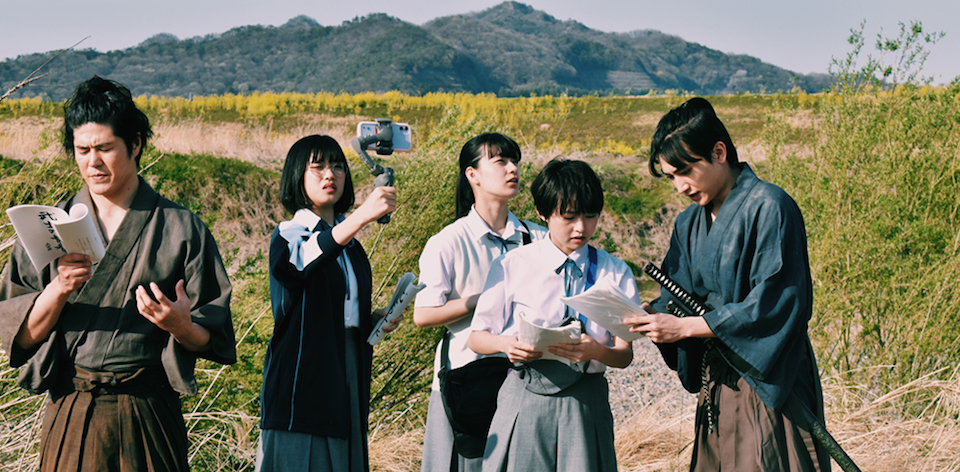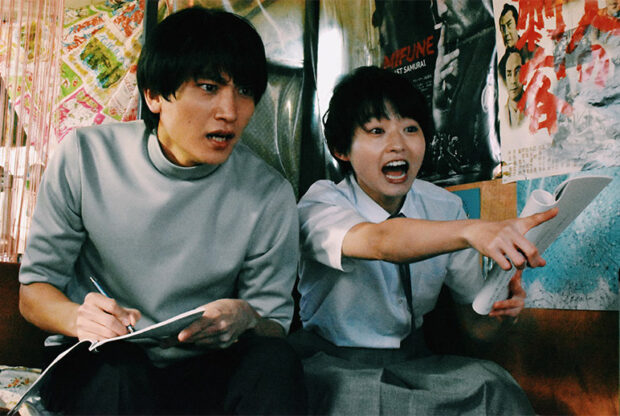The last 18 months or so have seen so many releases shift to digital, it’s made us all ponder the future of cinema. After all, think-pieces are the blogger’s equivalent of lockdown sourdough. The debate isn’t a new one of course, raging at least since the television entered homes in the middle of the last century. Soushi Matsumoto uses the question as a jumping off point for a summer adventure with a light sci-fi twist.
High-schooler Barefoot (Ito Marika) is obsessed with samurai films, and is miffed that the film club chose to fund Karin’s (Mahiru Coda) production over hers. Determined to bring her vision to life, she is inspired by newcomer Rintaro (Daichi Kaneko) to cast and shoot her own rival film called Samurai Spring. Yet it turns out that Rintaro is actually a time traveller from the future — and what he has to say about the fate of movies is disturbing.
From Naoyuki Miura of the theater troup Lolo and visual director Soushi Matsumoto, IT’S A SUMMER FILM (サマーフィルムにのって) is more than a simple love letter to cinema. It’s about finding your bliss and following it. Matsumoto’s movie opens with Karin’s film-within-a-film, a cloying rom-com that induces eye-rolling from our leads. Meanwhile, Barefoot and her gang sit around reading Yasutaka Tsutsui’s The Girl Who Leapt Through Time or watching Shintaro Katsu films. There’s a beautiful moment where Barefoot sits by herself in a retro cinema, grinning from ear to ear as she watches something several decades older than she is.
As film fans, we can relate to these moments of discovery. Yet more than anything, the production of Samurai Spring is merely the vehicle by which these kids find each other. The film’s soft high-concept only occasionally rears its head as we revel in the little moments: using a kid’s bike lights for production design, recruiting the Kendo Club to stage action, or simply hanging out on the beach and forgetting why they were there in the first place. In fact, you could say that it’s filled with all the youthful exuberance of a Daigo Matsui film.
The beautiful casting starts with Ito Marika, an original member of the idol group Nogizaka46 (the ‘official’ rivals to the infamous AKB48). Perhaps recognisable to film fans from her supporting roles in the Kakegurui series, her enthusiasm carries much of the film’s light narrative. A particularly fun addition is the 30-something Itabashi Shunya as Daddy Boy, a student who seems constantly surprised that people think he looks older than a teen.
You might dig deeper and see this as an analogy for something like climate change, with the kids valiantly fighting against the direction of a world they can’t change. In the end, IT’S A SUMMER FILM is exactly what it says: a film about the joys of summer in all their fleeting and life-changing moments. The surprising ending upends the potential fatalism and bids us farewell in a romantic moment. It’s exactly the kind of film Karin would have made.
IT’S A SUMMER FILM is reviewed as part of our coverage of Fantasia Festival 2021 and JAPAN CUTS 2021.
2020 | Japan | DIRECTOR: Soushi Matsumoto | WRITER: Naoyuki Miura, Soushi Matsumoto | CAST: Marika Ito, Daichi Kaneko, Yuumi Kawai, Kilala Inori | DISTRIBUTOR: Phantom Studios, Fantasia Festival 2021, JAPAN CUTS 2021 | RUNNING TIME: 97 minutes | RELEASE DATE: 5-25 August 2021 (Fantasia 2021), 20 August-2 September 2021 (JAPAN CUTS)







